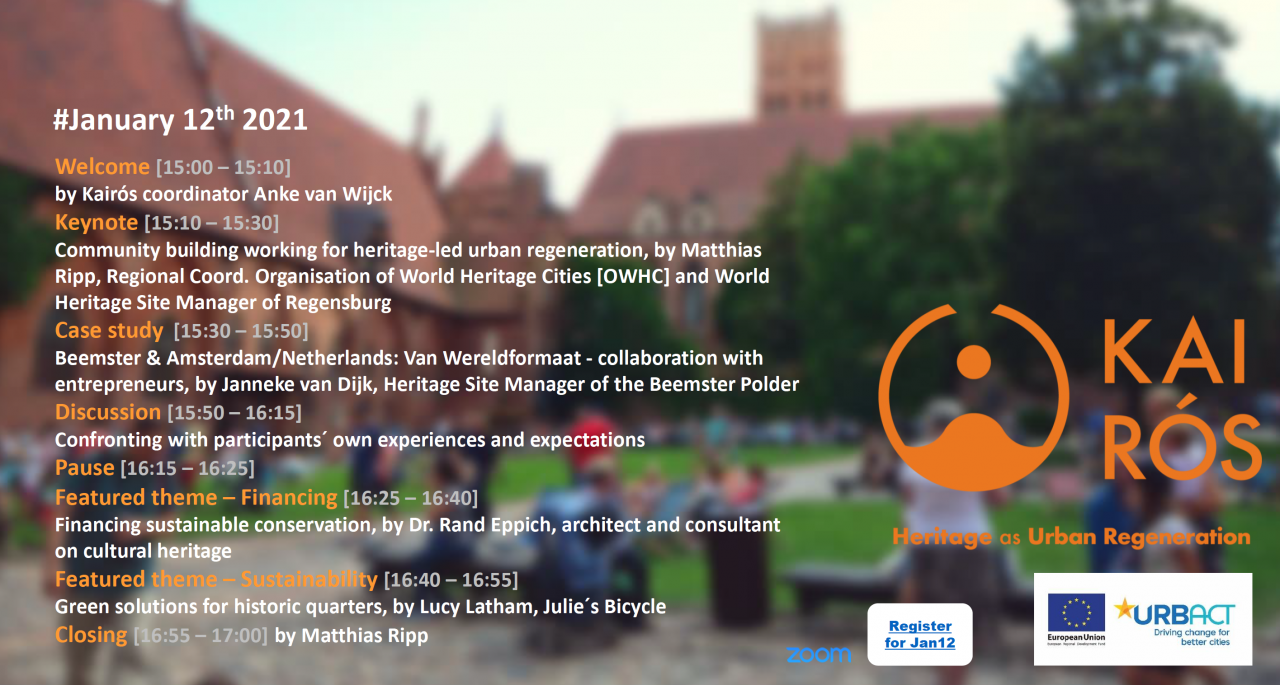
The second KAIRÓS warm-up webinar showed the potential and role of community involvement in heritage-based urban regeneration and how this is connected to urban resilience and sustainability.
The second of two warm-up webinars of the URBACT network KAIROS was held on 12th of January with broad participation from across Europe and beyond. In the focus of the event was community involvement in heritage-based urban regeneration and how this is connected to resilience and sustainability. Particular reference was given on how to include and stimulate entrepreneurship and manage especially financial sustainability at urban heritage sites. In an introductory keynote presentation, Matthias Ripp [World Heritage Site Manager of the City of Regensburg] defined the crucial phases, context and useful principles of community involvement connected to heritage-based urban development and regeneration and focused on the main obstacles and barriers for the successful implementation as well as tools and methods that can be helpful. After that, specific examples were presented and special topics were addressed.
Dr Rand Eppich showed how financial sustainability is a challenge of many heritage sites around the globe. He also presented principles and specific advice on how heritage sites can manage better to acquire this financial sustainability for example by an increased level of financial autonomy. Janneke van Dijk emphasised how entrepreneurs, which are not naturally close to heritage subjects, can be involved and encouraged to develop and offer heritage-related services that can help to address existing challenges, like the unbalanced and too concentrated visits of heritage landmarks in close vicinity. Lucy Latham from London-based Julie’s Bicycle showed how sustainability and resilience are linked to urban heritage with cases from around the world. She emphasised how urban silos need to be overcome to implement true sustainability. The presented cases and the keynote showed a range of common factors and strategies that possess a strong potential to be transferred to other cities.
Consequently, the following discussion was lively and many questions were raised. For example on how the communities need to be empowered to be able to participate in projects. To improve the financial sustainability, it was also suggested to involve those entities that are benefiting from heritage more in the cost for heritage. To implement a holistic and systemic understanding of urban heritage, it can also help to include it stronger in a wider context for example in the destination approach in tourism. Good collaboration between NGO’s and local governments can also help to achieve better (financial) sustainability. One participant remarked that: “A participation process is usually a kind of collective learning process: often it doesn’t happen, because facilitators, professionals and local administrators are not in the mood to learn from each other” and concluded that special attention should be given to this point. A strong agreement could be felt on the key message of the FARO convention, that heritage is only relevant when it is relevant for the people.
One result of the first KAIRÓS warm-up webinar in December 2020 has been that the strength and energy of local communities is a powerful resource and can be activated to support heritage-based urban development. The general findings of the second webinar are directly connected to this:
1. Heritage is a system in which everything is connected. Most important are the people, why they need to be involved in various ways in actions related to heritage-based urban regeneration and development.
2. Sustainability and Resilience are (systemic) principles which should guide projects and decisions in heritage-based urban regeneration and development.
3. A typical issue is weak financial sustainability. It can be improved for example by greater financial autonomy of the governing bodies in charge.
4. To use the positive power of local Entrepreneurship can help to address challenges for the benefit of local communities.
5. For successful heritage-based urban regeneration and development projects we need:
- Empowerment of communities to enable them to participate and be involved
- Empowerment of local authorities and their officers with necessary skills and knowledge (for example facilitation methods)
- An open and appreciative mindset of local authorities and their officers to trust that local communities have to make a valuable contribution.

The aim of these warm-ups was to ignite the in-depth discussion that will be organized in 2021 through four thematic workshops, namely
- Thematic workshop on Space “Valorisation and Adaptive Reuse in the Heritage City”, paired with Key Study Visit to Athens. Heraklion. Finally transformed into an online event.
- Thematic workshop on Economy “Cultural Heritage as a Driver for Innovation, Entrepreneurship and Job Creation”. Roskilde.
- Thematic Workshop on Attractiveness “Re-Imagining the Heritage City: from Local Identity to Destination Management”. Malbork.
- Thematic Workshop on Social Cohesion “Accessibility and Inclusiveness at Historic Quarters”, paired to Key Study Visit to Vilnius. Ukmerg .
Easiest way to follow up KAIRÓS activities is to join its Linkedin group “Urbact-Kairós. Heritage as Urban Regeneration”

